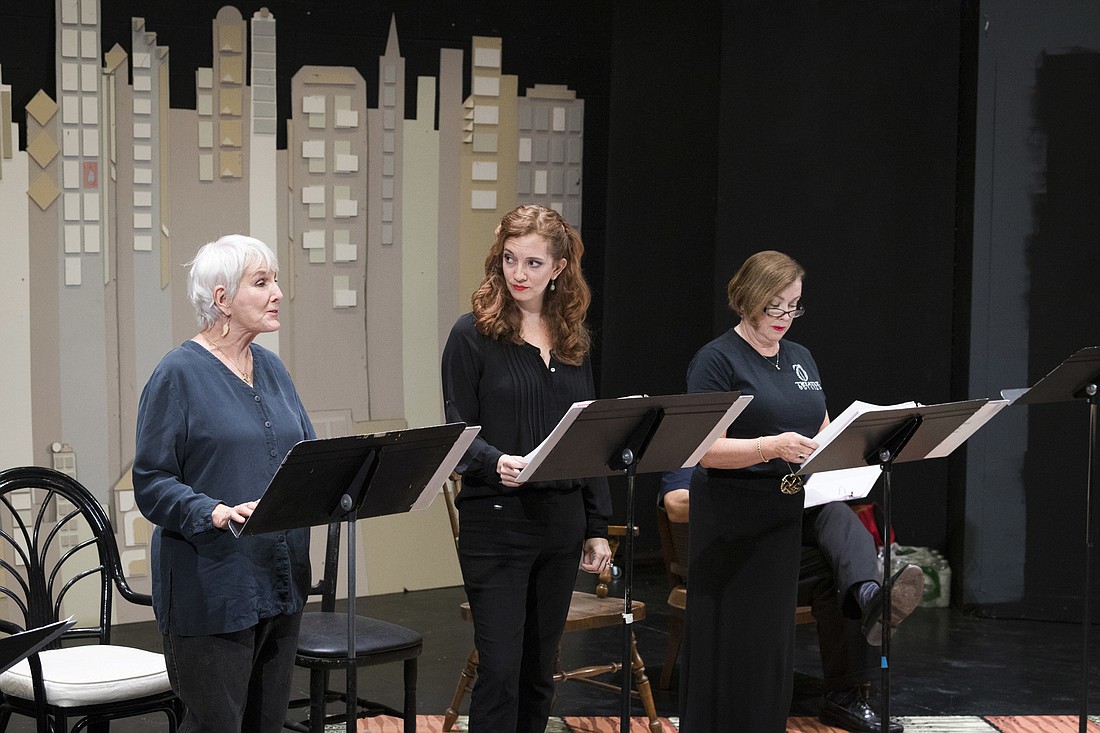- November 23, 2024
-
-
Loading

Loading

Homer’s original “Odyssey” was a 10-year journey. Theatre Odyssey has actually outdistanced brave Odysseus — its performing arts voyage is now in its 13th year.
Following the example of Homer’s epic hero, the organization continually reinvents itself. This year, it launched a juried, one-act play festival and didn’t limit it to area-based creators. Playwrights around the country could submit their scripts.
Tom Aposporos is the theater group’s co-founder and emeritus director. “Supporting our tremendous local talent is at the heart of our mission,” he says. “But if you never look beyond your immediate region, parochial thinking sets in. We always wanted to expand our reach.”
To achieve this goal, Theatre Odyssey reached out to playwrights nationwide; they responded with more than 100 anonymous submissions. A panel of theater professionals selected the 12 best. These were featured Sept. 10-13 in unstaged readings. The judges narrowed that down to the four finalists. These will be fully staged at the One-Act Play Festival from Nov. 1-4 at Glenridge Performing Arts Center. All four plays will be performed during each presentation.
Here’s a sneak preview of the world-premiere short plays:
Directed by Ren Pearson
This playwright is known for comedy. This time, he takes a walk on the dark side. Moss’ science fiction nightmare unfolds in the near future. To play a game, a teenage girl agrees to be tagged with an ankle cuff. But the device is a malevolent AI, and the games it plays are cruel. It cajoles her, manipulates her, drugs her, shocks her and imprisons her — always leading her on with the hopes of making it to the next level. This future may be too close for comfort. Moss was inspired by real-life muggers, who used the “Pokemon Go” cellphone app to lure unwary victims to secluded locations.
Directed by Carole Kleinberg
Aultman’s poignant play has the haunting feel of one of Flannery O’Conner’s surreal parables. This parable revolves around Mary and Peter — a 40-something married couple who can’t conceive a child. Mary finds creative fulfillment taking art classes at a local university. After a fuse blows, the class moves to a nearby science lab. Mary discovers a jar containing a full-term female fetus. She draws it again and again. As her relentless series continues, Mary becomes obsessively attached to the fetus — and detached from her husband. One question drives her mad: “Who was the missing mother?” Art can ask the question, but it can’t give the answer.
Directed by Michael Newton-Brown
Back in the 1970s, the Merry-Go-Round was a successful yet dysfunctional rock band. The years that followed were packed with breakdowns, break-ups and rock star dramatics worthy of Spinal Tap. Tonight’s their final concert — they mean it this time. Showtime is less than an hour away, and the band is a no-show. Their manager has one of many backstage freak-outs. The band finally appears — and that only makes things worse. The backstage mind games instantly begin. The final show might not go on. Are the boys finally too old for rock ’n’ roll? Stewart’s play gets laughs, but also gets real. Like any ride, the Merry-Go-Round must end. Until the music stops, there’s a serious meditation on time, art and friendship behind the laughter.
Directed by Bob Trisolini
The title may sound cold, bit don’t let it fool you. It’s actually a warmhearted play. The fish in question is sushi. For the play’s unnamed boomer “Dad” and his millennial “Daughter,” hanging out at sushi joints is a family tradition. This time around, the waiter is missing in action. But it’s all for the best. The playwright fills up the downtime with her sprightly, pitch-perfect dialogue. Daughter puts Dad on the spot in a lightning-round discussion of personal boundaries, parenting styles, job opportunities, the food service industry, money and most embarrassing moments. Dad keeps his cool through all her needling ... almost. Aultman’s play never turns bitter. And love is always on the menu.
At the festival’s conclusion, a panel of theater professionals will judge the two top plays. The winning playwright will be awarded $1000; $500 will go to the runner-up.
According to Aposporos, the festival spurs American playwrights to create new work. In the process, they also learn to create better work.
“As any writer knows, the short form is hard,” he says. “To write a decent one-act play, you have to trim the fat and make every word count. I think it leads to a better quality of writing. When the playwrights tackle their next full-length play, I think the results will show.”